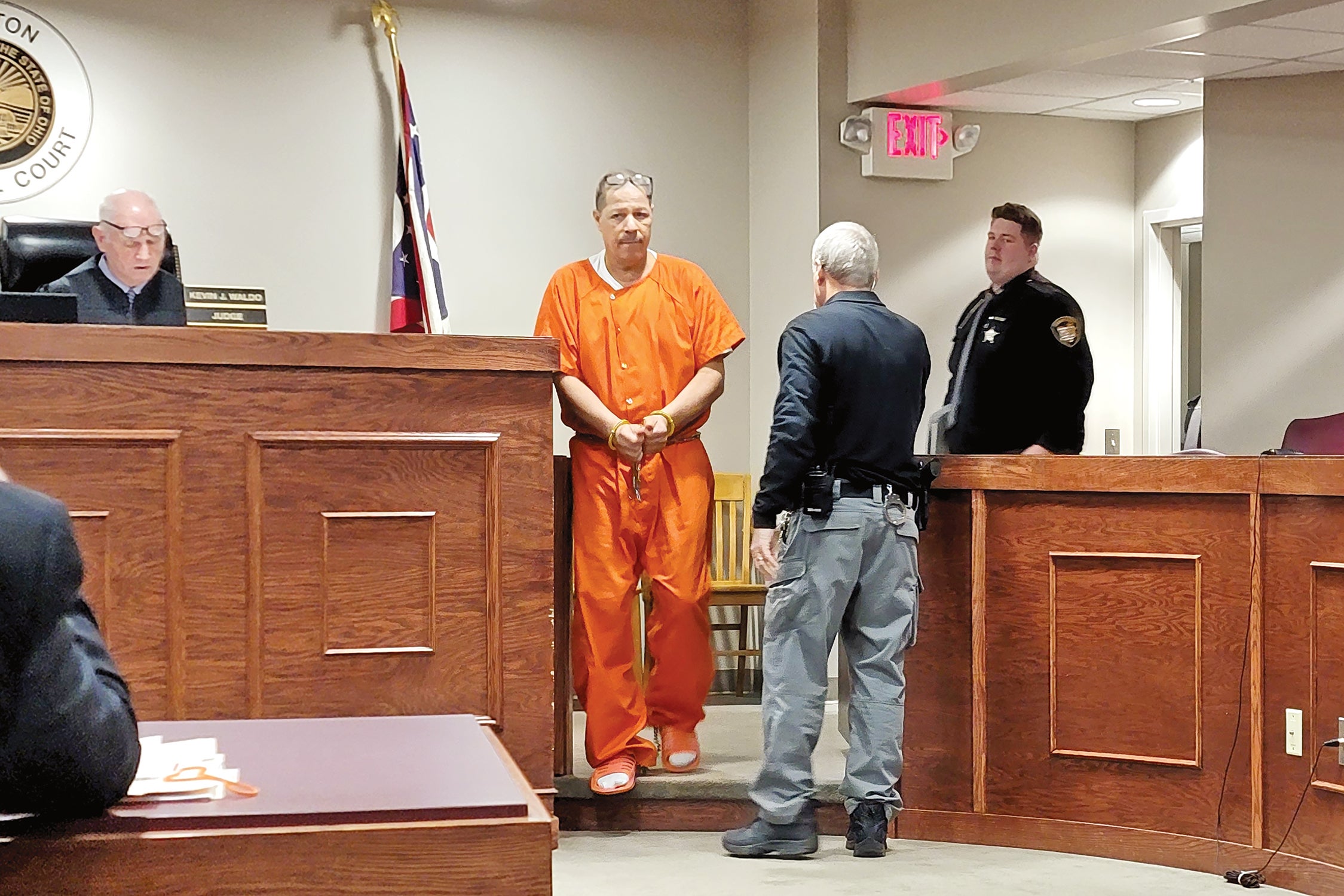‘Over the edge’
Published 12:00 am Saturday, February 25, 2023

- Accused murder suspect Joseph Lewis, in orange jumpsuit, enters the Ironton Municipal Court on Thursday for a probable cause hearing. (The Ironton Tribune | Mark Shaffer)
Defendant keeps trying to speak as lawyer tries to keep him quiet during hearing on murder charge
During a probable cause hearing about a murder case on Thursday, the accused, Joseph Lewis, was advised by both his attorney, Roger Smith, and Ironton Municipal Court Judge Kevin Waldo that he should use his right to remain silent after he kept trying to tell the court “something important,” much to the annoyance of his defense lawyer.
Early Tuesday morning, Lewis, 58, was arrested by the Ironton Police Department for the murder of Jeri Crabtree, 59.
According to a press release from the Ironton Police Department, the case began after the IPD got a call about a fatal overdose at Lewis’ apartment at 116 ½ S. Seventh St. around 4 a.m. on Tuesday.
Officers arrived and, after knocking at the front door and getting no response, they looked in the kitchen window and saw a man and a woman lying on the kitchen floor.
They knocked on the window and were told to use the front door, which was unlocked.
When they entered the building, officers saw Lewis sitting next to Crabtree, who appeared to have severe injuries.
The officers handcuffed Lewis and called for medical assistance for Crabtree.
The Lawrence County Coroner’s Office was called to the scene and pronounced her dead.
At the hearing in Ironton Municipal Court on Thursday, Lawrence County Prosecutor Brigham Anderson passed on making an opening statement and instead called the state’s first witness, IPD detective Capt. Brian Pauley, who is the investigator on the case.
Anderson asked him if anyone besides Lewis and Crabtree were in the apartment and Pauley said there was not.
Anderson asked the detective to describe the injuries to Crabtree.
“She had what appeared to be several lacerations across her neck and her throat. She had bruising and swelling along the side of her face. And she had blood appearing to come out of her nose and her mouth,” Pauley said.
He said her body was taken for autopsy and a preliminary autopsy report had been released to him.
Anderson asked him to tell the court what the preliminary results were.
Pauley said they do not have a definitive cause of death as of yet, but that she did have “stabbing, strangulation and asphyxiation.”
Anderson asked Pauley if he interviewed Lewis and whether he had been read his Miranda rights. He said yes to both of the questions.
“When I spoke to Mr. Lewis, he advised me that she kept picking at him and picking at him and that they had gotten into an altercation where he said she had hit him,” Pauley testified. “He said the altercation just kept getting heated and that it just escalated to where he found that she had pushed him ‘over the edge’ – That is what his words were”
The detective said he spoke to Lewis at the hospital and then after he was released from the hospital when he was “more clear headed.”
Anderson asked if Lewis appeared to be under the influence of anything.
“To me, no,” Pauley responded.
Lewis’s attorney, Roger Smith, asked Pauley about his comment about talking to Lewis a second time when he seemed more clear headed.
“Did he seem agitated, upset, nervous, confused?”
“He was back and forth on his emotions, really,” Pauley said.
Smith then asked if his client had any visible injuries.
“He had a bruise on his thigh and maybe one on one of his shins,” Pauley said.
Smith then asked where Crabtree lived and Pauley said she lived in the Park Avenue Apartments.
Lewis gave Crabtree’s address and Smith motioned for him to be quiet.
Smith then had Pauley confirm Lewis’s address and asked if Crabtree was on the lease, to which Pauley said he didn’t know.
Lewis said “no,” indicating she was not on the lease.
Smith asked if there were any empty pill bottles in the apartment and Pauley confirmed that he had put a clozapine pill bottle into evidence.
Smith then confirmed that the investigation was still going on and then asked Pauley if there were any other suspects in the case.
“Not at this time,” the detective said.
Smith said that was all the questions he had.
Anderson had Pauley confirm that bite on the thigh and then asked if Lewis said the fight was over him talking to another woman. Pauley said that was right.
Anderson then asked if Lewis said he had blacked out at some point and that when he awoke, he tried to wake up Crabtree and knew she was deceased.
“Is that right?” Anderson asked.
“Yes,” Pauley said.
Anderson then asked if Lewis made statements about “wanting the electric chair” and that he “wanted lethal injection.”
“He did,” Pauley said.
Anderson confirmed that those statements were recorded.
Smith resumed his questions by asking Pauley if he knew what started the altercation. Pauley said he did not.
After Smith ended his questions, Waldo asked Anderson if he had a closing argument. He said he did not.
Lewis again tried to speak to Waldo.
“Please, let me speak,” he said.
“No,” Smith interrupted. “No, no. You can’t ruin your case at this hearing. This is a preliminary hearing. We can talk about this…”
“I just need to make one thing clear, please,” Lewis said.
“No. No. Do not,” Smith said. “I’m advising you not to speak at this hearing. We are going to talk about this. If he binds it over, it is going to common pleas. We can talk later.”
Smith then spoke to the judge.
“Nothing, your honor. No witnesses,” he said.
Lewis spoke up a fourth time.
“Sir, I respect what you said. But please, I please want to talk,” he said.
Smith again addressed Waldo.
“I do not want my client to talk to you,” he said. He then spoke to Lewis again. “You are facing a murder charge.”
“Yes, sir,” Lewis said. “That’s why I want…”
“You are being recorded. I told you, you cannot win your case at this hearing,” Smith interrupted. “We’ve got to talk. It is going to be bound over to common pleas, you will have your day in court, but it is not today.”
Waldo started speaking but Lewis interrupted again.
“Judge, can you help me? I please want to speak,” he said.
Waldo ignored Lewis’s request and spoke to his lawyer.
“I am going to try again to advise your client, Mr. Smith, that the municipal court venue, which is where this case is at at this present time and which is conducting a preliminary hearing that both sides have rested on. And anything you say in a courtroom or to anybody about this matter, can and will be used against you at a later date,” Waldo said. “Now, that situation stems from the right you have to remain silent. And it is a very important right that any criminal defendant has.”
The judge went on to explain that remaining silent puts the burden on the state to bring forth the evidence to convict someone without “you trying to assist them in that endeavor.”
Waldo explained that anything Lewis said would bring him problems in this case and it “was of the utmost of importance as far as the scale of criminal responsibility and punishment. It is a felony of the first degree and it has serious consequences. So anything you say is being recorded and it gives the state a better opportunity to convict you of this crime. So, I am again going to ask you to hold your comments.”
After that, Waldo found that there was sufficient probable cause presented by the state and bound the case over to the grand jury for consideration.
He also continued the $1 million bond.
Lewis interrupted again.
“Sir, it is very… I respect what you are saying, your honor, sir, but it is very important…”
Smith cut him off again.
“You are going to talk yourself into a lifetime prison sentence if you say another word,” he said.
“Your honor, please,” Lewis begged, before Smith cut him off again.
“I’ve been doing this for 33 years and I am telling you, nothing can come of whatever you say. Nothing. We are going to talk. I am going to file motions. I am going to challenge evidence. We can’t do it here. We can talk in private.”
Still Lewis tried again.
“I need one thing to say. Please,” Lewis said.
“We conclude the hearing, your honor,” Smith said.
With that, Waldo thanked everyone and the hearing was over.





